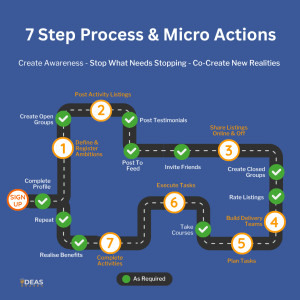Affording the Unaffordable
Core Information
Ambition & Activity Detail
A Manifesto for Post-Austerity Governance
We are told we can’t afford it.
We can’t afford fair wages for nurses, teachers, or civil servants.
We can’t afford dignity for the elderly, or proper welfare for those in need.
We can’t afford clean energy, safe transport, or housing fit for human life.
We’re told: “The debt is too high. The coffers are empty. Tighten the belt.”
But let’s pause and ask: Is that true?
Do We Really Mean Debt?
Government debt is not household debt. Unlike you or me, the state:
>>> Prints its own currency (if sovereign)
>>> Borrows long-term at low interest
>>> Never truly “runs out of money” — it runs out of political will
The real question is not how much we owe, but:
What are we doing with what we borrow?
Is the public debt building capacity — or just plugging holes?
Affording What Matters
We don’t ask “how can we afford it?” when banks collapse.
We don’t ask it when subsidising fossil fuels or bailing out corporations.
But when it comes to:
>>> Paying workers fairly
>>> Providing public housing
>>> Supporting the vulnerable and elderly
We’re told it's unaffordable.
This isn’t about affordability.
It’s about political priorities.
Nationalise What We Need, Run It Well
Not everything should be public — but some things must be:
>>> Energy, water, rail — basic infrastructure should serve people, not profits.
>>> Health and elder care — not places for shareholders to extract dividends.
But nationalisation alone isn’t enough. We need:
>>> Competent public institutions
>>> Accountable leadership
>>> Public input and democratic oversight
End Rule by the Unelected
Too often, power lies with:
>>> Central banks serving financial markets, not people
>>> Regulatory bodies captured by the industries they regulate
>>> International institutions dictating austerity from abroad
We need democratic control over public decision-making — or we live in a managed democracy, not a real one.
And What of Our Politicians?
Yes, many are inept. But this is by design:
>>> Short-term elections breed short-term thinking
>>> Big donors distort priorities
>>> Media platforms reward outrage, not outcomes
We need structural reform:
>>> Proportional representation
>>> Campaign finance laws
>>> Citizen assemblies to hold the centre
Build Capacity, Not Just Balance Sheets
The real economy is not numbers on a ledger — it is:
>>> A child learning in a well-funded school
>>> A family not falling into poverty after illness
>>> An elderly person treated with dignity, not neglect
We can afford the “unaffordable” — if we remember that money is a tool, not a god.
And we must use it not to survive austerity, but to build a society worth sustaining.
Supporting Information
Location & Impact Details
Vote To Help Prioritise Activity Listing
You must be logged in to rate.
Contact Details
There are no reviews yet.



